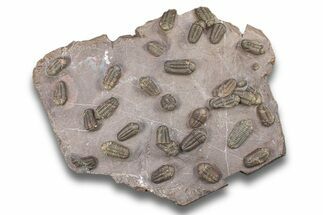1.6" Phacopid (Adrisiops) Trilobite - Jbel Oudriss, Morocco
This is a 1.6" long (if outstretched) phacopid (Adrisiops weugi) trilobite from Jbel Oudriss, Morocco. Adrisiops had been informally referred to as 'smiley Phacops' until it was described as the type species of a new genus in 2017. It is one of the less frequently seen genera of phacopids from Morocco.
It comes with an acrylic display stand.
Restoration makes up approximately 2% of this specimen. The restoration is along the segments of the trilobite.
It comes with an acrylic display stand.
Restoration makes up approximately 2% of this specimen. The restoration is along the segments of the trilobite.
About Trilobites
Trilobites are an extinct class of marine arthropods that thrived for nearly 270 million years, from the early Cambrian to the end of the Permian period (around 521 to 252 million years ago). They are one of the most successful and diverse groups in the history of life, with over 25,000 described species spanning a wide range of sizes, shapes, and ecological niches. Known for their distinctive, segmented exoskeletons, trilobites provide invaluable insights into the evolutionary history of arthropods and the dynamics of ancient marine ecosystems.
Trilobites are an extinct class of marine arthropods that thrived for nearly 270 million years, from the early Cambrian to the end of the Permian period (around 521 to 252 million years ago). They are one of the most successful and diverse groups in the history of life, with over 25,000 described species spanning a wide range of sizes, shapes, and ecological niches. Known for their distinctive, segmented exoskeletons, trilobites provide invaluable insights into the evolutionary history of arthropods and the dynamics of ancient marine ecosystems.
$99
SPECIES
Adrisiops weugi (van Viersen, Holland & Koppka, 2017)
LOCATION
Jbel Oudriss, Morocco
FORMATION
El Otfal Formation
SIZE
Trilobite: 1.6" long (if outstretched), Limestone: 2.9 x 2.4"
CATEGORY
SUB CATEGORY
ITEM
#251628
We guarantee the authenticity of all of our specimens.
 Reviews
Reviews















